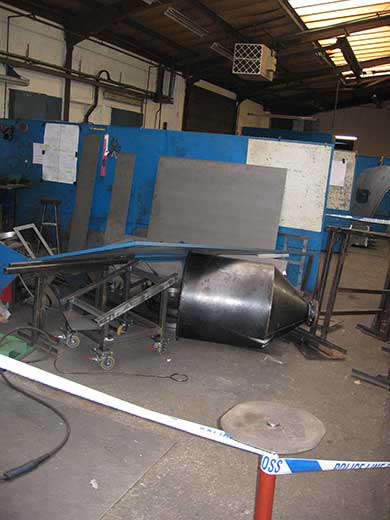
A worker had to have both legs amputated and now has restricted movement in his arms following an explosion at a factory in Worcestershire.
Clive Dainty, from Kidderminster, was working at Filtration Service Engineering Ltd on 8 December 2011 when a 335-litre vessel exploded as it was being pressure tested.
The extent of the explosion tore the two parts of the vessel apart, with one part hitting 51-year-old Mr Dainty and forcing him into a cabinet against a wall.
He was hospitalised for several months and had to have both legs amputated. He also suffered head injuries and has severely restricted movement in his arms, which have been repaired with metal plates.
An investigation by HSE found that Filtration Service Engineering was testing the vessel as there were concerns about the quality of the welding. However, instead of simply filling it with water, the firm decided to use compressed air.
Worcester Crown Court heard on 20 February that the factory’s compressed air supply was directly connected to one of the vessel’s openings. A valve, which could be manually opened and closed, and a pressure gauge were installed and the vessel filled with compressed air. The pressure built up to such an extent that eventually the vessel exploded.
Filtration Service Engineering Ltd, of the Oldington Trading Estate, Kidderminster, was fined £30,000 and ordered to pay £15,325 in costs after pleading guilty to breaching section 2(1) of the HSWA 1974.
Following the hearing, HSE inspector, Ed Fryer, said: “The injuries sustained in the incident were more akin to those sustained on a battlefield. The vessel exploded like a bomb during the course of a normal working day, and everyone in the factory was at risk from the operation because no measures were put in place to protect them.
“Pneumatic testing is a dangerous activity and significant planning is required to ensure the risks are managed. The management of health and safety in this factory was woefully inadequate and simple measures could have been implemented to prevent the incident from happening.
“An assessment of the risks involved in pneumatic pressure testing should have identified that air was not a suitable testing medium. The test could have been carried out by simply filling the vessel with water. It is a miracle that more people were not injured and that nobody lost their life.”
Fire Safety in 2023 eBook
SHP's sister site, IFSEC Insider has released its annual Fire Safety Report for 2023, keeping you up to date with the biggest news and prosecution stories from around the industry.
Chapters include important updates such as the Fire Safety (England) Regulations 2022 and an overview of the new British Standard for the digital management of fire safety information.
Plus, explore the growing risks of lithium-ion battery fires and hear from experts in disability evacuation and social housing.


